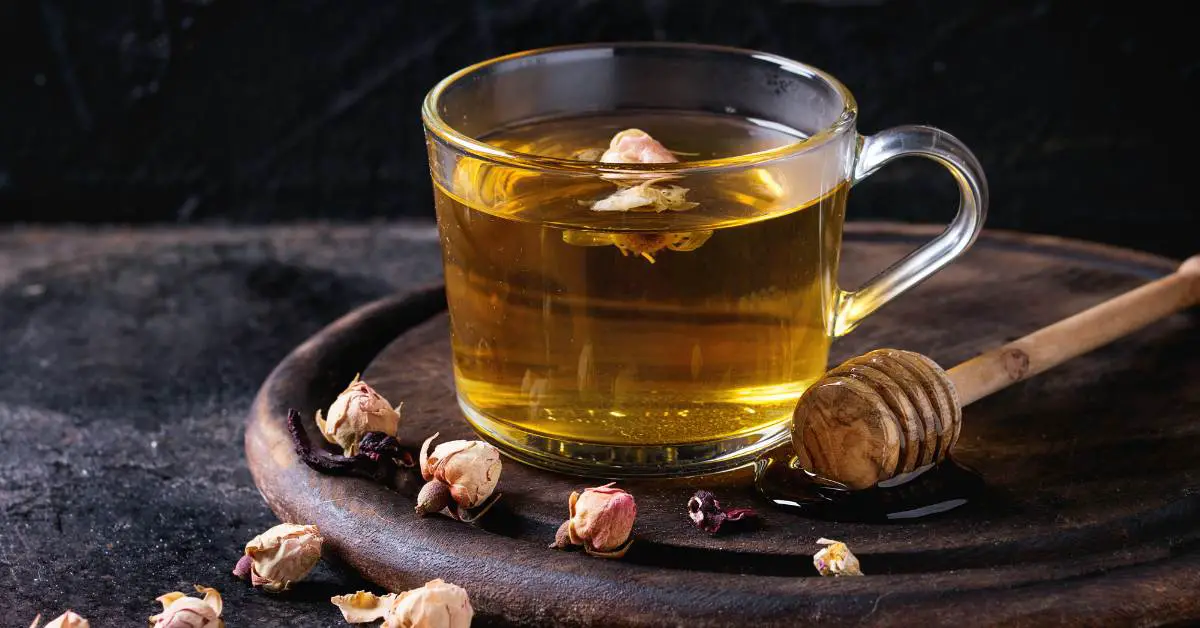What is the best antihistamine tea? If you’ve ever experienced histamine intolerance, you know how uncomfortable the symptoms can be The runny nose, itchy eyes, pesky hives, and digestive symptoms that make life challenging.
But, as you know, what you eat and drink matters for managing histamine intolerance symptoms.
The first step in managing histamine intolerance is to reduce the histamine content of your diet. This means removing high-histamine foods from your diet and foods that boost the release of histamine from mast cells, so-called histamine liberators.
But there’s also a potential benefit to adding foods or beverages with anti-inflammatory and antihistamine activity to your diet.
If you love tea, you might wonder if there’s a particular antihistamine tea or tisane that could help you control the negative effects that excess histamine has on your health and well-being.
“Is there a magical antihistamine tea that save me from histamine hell?” If only it were that simple! Unfortunately, there’s no tea or beverage proven to tame histamine intolerance symptoms in everyone.
But here’s the good news! Some have antihistamine activity and anti-inflammatory activity that may help you in your journey to soothe the symptoms of histamine intolerance.
Let’s look at some and see if there is a best antihistamine tea for histamine intolerance.
Nettle Tea
Nettle tea contains natural compounds that may reduce histamine reactions in the body. So, if you’re tired of histamine’s shenanigans, this tea is a safe bet. But there’s more!
Nettle tea doesn’t just stop at histamine busting. Studies show it has anti-inflammatory activity and, because of its antihistamine properties, helps with allergies. (1)
According to one study, (1) an extract from nettle blocks inflammation in a lab setting. One way it does this is by acting as a decoy for the histamine receptor, blocking it, without causing the negative effects that histamine does.
It also blocks other enzymes, including one called tryptase, that trigger some of the symptoms of allergies, including seasonal allergies.
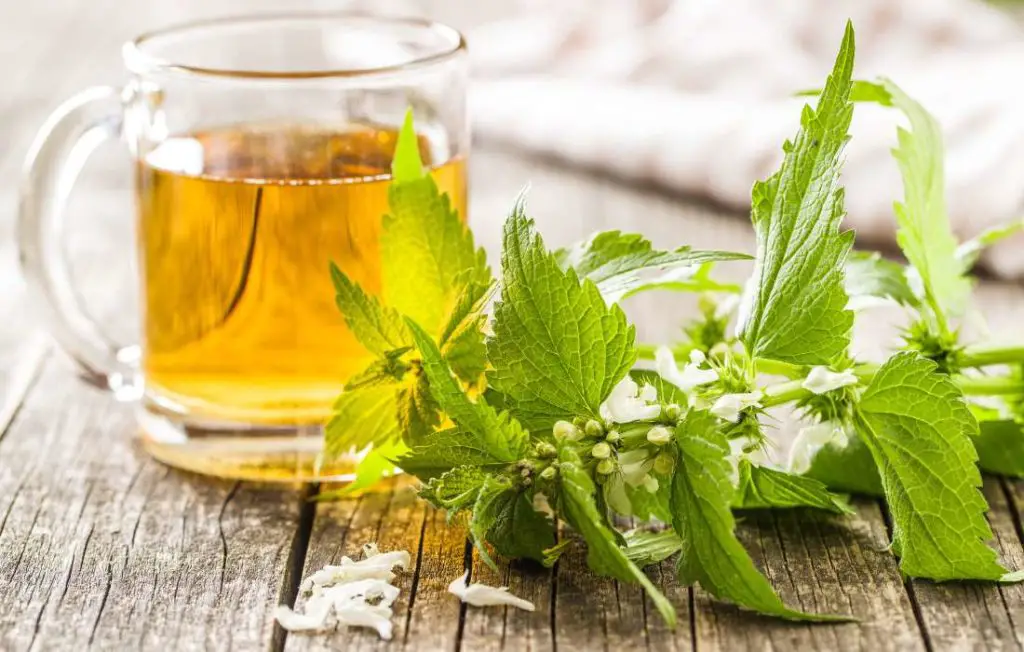
Butterbur Tea
Butterbur, or Petasites hybridus if you’re into the scientific lingo, is a herb that hails from Europe and parts of Asia. It’s been a star player in herbal medicine for ages, and for good reason!
This herb has potential antihistamine properties that make it potentially beneficial for histamine intolerance and allergies.
Let’s dig a little deeper. Butterbur contains two active compounds of interest, known as petasin and isopetasin. These little warriors help put the brakes on histamine production in your body.
Studies in rodents show that butterbur helps suppress allergic symptoms and allergic reactions. (2) And researchers have even looked at the effect of butterbur on allergy symptoms in humans with encouraging results.
Butterbur tablets suppress pesky allergy symptoms by blocking a receptor called the LT receptor involved in allergic symptoms. (3.4) By sipping on a steamy cup of butterbur tea, you’re giving those histamines a taste of their own medicine.
Brewing this allergy-busting tea is as easy as pie. Grab some dried butterbur leaves or root extracts, toss a teaspoon into hot water, and let it steep for about 5-10 minutes. You’ll end up with a delicious, earthy-flavored potion that’s pleasant to sip.
But before sipping butterbur tea, keep this in mind. Some parts of the butterbur plant contain something called pyrrolizidine alkaloids, and those babies can be harmful to your liver.
That’s why it’s crucial to go for the good stuff – butterbur tea made from certified PA-free extracts. Those undergo a process that kicks those pesky alkaloids to the curb, keeping your liver happy and healthy.
Ginger Tea
Ginger, that fiery root we all know and love, isn’t just for adding a kick to your stir-fries and teas. You can also use it to make antihistamine tea. This herbal hero is chock-full of compounds that help reduce histamine production.
Studies show that ginger has anti-inflammatory and antihistamine properties, all of which is beneficial if you have histamine intolerance. (5, 6)
Brewing up this antihistamine tea is easy. Simply slice up some fresh ginger or grab a bag of ginger tea from your local store, toss it in hot water, and let it steep for a few minutes.
The result? A soothing, aromatic potion that’ll relax your mind and body while giving you its antihistamine and anti-inflammatory benefits.
And the best part? Ginger tea doesn’t come with the side effects that go along with pharmaceutical antihistamines. It’s a natural remedy that’s gentle on your system but packs a punch against excess histamine.
Now, here’s a friendly reminder: before you go all-in on the ginger tea train, chat with your healthcare pro.
They’ll make sure it’s a safe bet, especially if you’ve got some other health issues going on or are taking medications that ginger and other herbs can interfere with. That’s true of any herb you use or tea you sip.
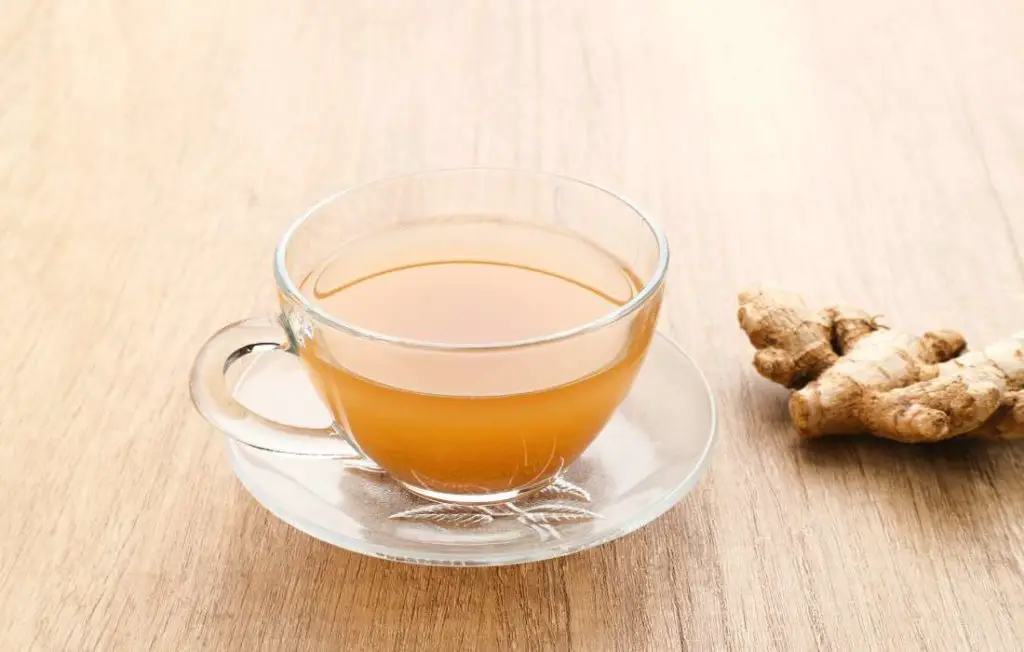
Rooibos Tea
Rooibos tea is a caffeine-free tisane, or herbal tea, packed with powerful antioxidants and anti-inflammatory compounds.
It’s also known as red bush tea, hails from South Africa, where people have cherished it for centuries for its health benefits.
Along with antioxidants that are ready to wage war against free radicals in your body, Rooibos tea comes equipped with anti-inflammatory superpowers.
Rooibos tea contains bioflavonoids, including aspalathin, nothofagin, quercetin, rutin, and others, with aspalathin being exclusive to rooibos. (7) These bioflavonoids have antihistamine and anti-inflammatory properties.
Brewing a cup of this goodness is a piece of cake. Grab some rooibos tea leaves or tea bags, pop them into hot water, and let them steep for a few minutes. The result? A soothing, aromatic potion that’ll have you feeling like you’re on cloud nine.
And here’s the cherry on top: rooibos tea is caffeine-free! So you can indulge in this delightful elixir day or night without worrying about jitters or sleepless nights. It’s an ideal if you’re trying to ditch caffeine but still enjoy a flavorful and healthful tea.
Now, here’s a pro tip: you can get creative with your rooibos tea game! Add a dash of honey for a touch of sweetness or a bit of real maple syrup. The possibilities are endless, and your taste buds will thank you for it!
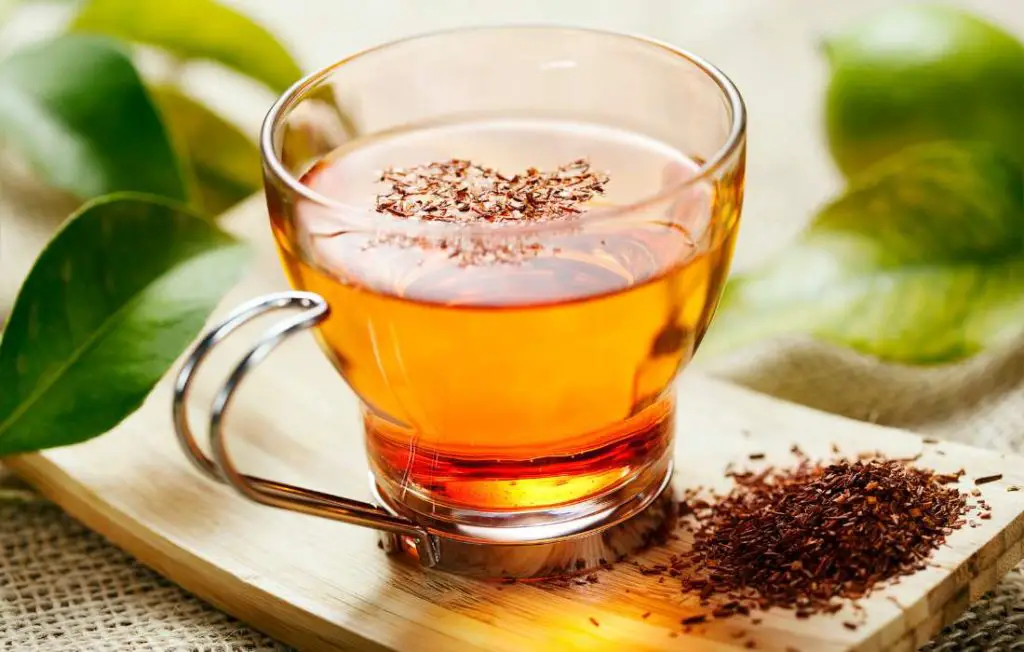
Reishi Mushroom Tea
Have you ever tried Reishi mushroom tea? Reishi mushrooms, also known as Lingzhi mushrooms, have been revered in traditional medicine for centuries. They’re not just a fancy fungi – they have potential health benefits.
Reishi mushroom tea is armed with compounds that may help put the brakes on histamine production and may help with allergy symptoms too. (9) They also have antioxidant activity. (8) Allergies happen when the immune system goes a bit haywire and overreacts to harmless stuff.
But fear not, Reishi mushroom tea steps in to bring peace and harmony to your immune warriors, reducing those inflammatory responses that cause trouble.
Brewing up this mystical potion is a breeze. Simply add dried Reishi mushroom slices or powder, throw them into hot water, and let them work their magic for a few minutes.
The result? A warm, earthy-flavored tea that’s not only a treat for your taste buds but a gift to your health.
And here’s a pro tip for you adventure seekers out there: Reishi mushroom tea can be a bit strong on its own, so feel free to add a dash of honey or some steamed oatmilk for a delightful twist.
Reishi mushroom tea antihistamine champ that keeps histamines in check and brings harmony to your immune system.
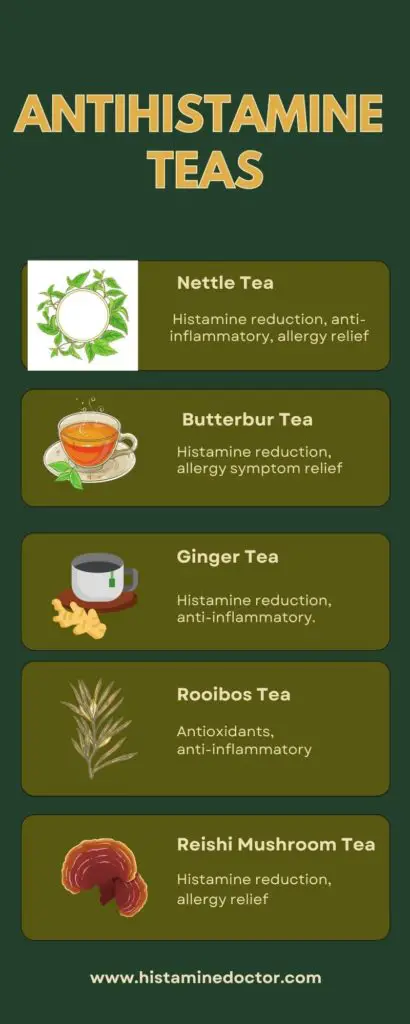
Antihistamine Tea and The Low-Histamine Diet
Are there low-histamine teas? It’s always smart to check with your doc before diving into any new health routine. They can make sure nettle tea is right for you and that it won’t interfere with any other medications you might be taking.
And here’s a pro tip for you savvy tea lovers out there: Don’t be afraid to get creative with your tea game!
You can mix nettle tea with other herbal allies like ginger to create your own custom blend. The possibilities are endless, and your taste buds will thank you!
So, there you have it, folks. When histamine intolerance has got you down, reach for a cuppa of nettle tea, and let nature work its magic. It’s a natural, soothing way to put those histamines in their place and reclaim control over your comfort.
Sip away, and here’s to health!
References:
- Roschek, B., Fink, R., McMichael, M., & Alberte, R. (2009). Nettle extract (Urtica dioica) affects key receptors and enzymes associated with allergic rhinitis. Phytotherapy Research, 23. https://doi.org/10.1002/ptr.2763.
- Alhusayan, R., Aldahmash, B., El-Nagar, D., Rady, A., Ibrahim, K., & Alkahtani, S. (2020). Butterbur (Petasites hybridus) Extract Ameliorates Hepatic Damage Induced by Ovalbumin in Mice. Oxidative Medicine and Cellular Longevity, 2020. https://doi.org/10.1155/2020/3178214.
- Shimoda H, Tanaka J, Yamada E, Morikawa T, Kasajima N, Yoshikawa M. Anti type I allergic property of Japanese butterbur extract and its mast cell degranulation inhibitory ingredients. J Agric Food Chem. 2006 Apr 19;54(8):2915-20. doi: 10.1021/jf052994o. PMID: 16608208.
- Shimoda H, Tanaka J, Yamada E, Morikawa T, Kasajima N, Yoshikawa M. Anti type I allergic property of Japanese butterbur extract and its mast cell degranulation inhibitory ingredients. J Agric Food Chem. 2006 Apr 19;54(8):2915-20. doi: 10.1021/jf052994o. PMID: 16608208.
- Chen, B., Wu, P., Chen, K., Fu, T., Wang, H., & Chen, C. (2009). Antiallergic potential on RBL-2H3 cells of some phenolic constituents of Zingiber officinale (ginger).. Journal of natural products, 72 5,950-3. https://doi.org/10.1021/np800555y.
- Jalali, M., Mahmoodi, M., Moosavian, S., Jalali, R., Ferns, G., Mosallanezhad, A., Imanieh, M., & Mosallanezhad, Z. (2020). The effects of ginger supplementation on markers of inflammatory and oxidative stress: A systematic review and meta-analysis of clinical trials.. Phytotherapy research : PTR. https://doi.org/10.1002/ptr.6638.
- Bramati L, Minoggio M, Gardana C, Simonetti P, Mauri P, Pietta P. Quantitative characterization of flavanoid compounds in Rooibos tea (Aspalathus linearis) by LC-UV/DAD. J Agric Food Chem 2002;50(20):5513-9.
- Keypour, S., Mirzania, F., & Farimani, M. (2019). Antioxidant Activity, Total Flavonoid and Phenolic Contents of Three Different Extracts of Hyrcanian Reishi. Current Bioactive Compounds. https://doi.org/10.2174/1573407213666171107151007.
- The Use of Ganoderma lucidum (Reishi) in the Management of Histamine-Mediated Allergic Responses | Mycology Research Laboratories. Mycologyresearch.com. Published 2023. Accessed July 28, 2023. https://www.mycologyresearch.com/articles/the-use-of-ganoderma-lucidum-reishi-in-the-management-of-histamine-mediated-allergic-responses

